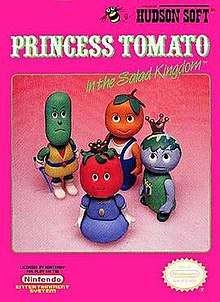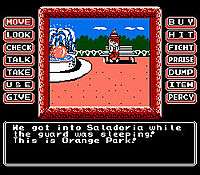Princess Tomato in the Salad Kingdom
| Princess Tomato in the Salad Kingdom | |
|---|---|
 NES North American boxart | |
| Developer(s) | Hudson Soft |
| Publisher(s) | Hudson Soft |
| Composer(s) | Tomotsune Maeno |
| Platform(s) | NEC PC-8801, NEC PC-6001, FM-7, MSX, NES/Famicom, Virtual Console |
| Release |
Home computers
[2]
|
| Genre(s) | Adventure |
| Mode(s) | Single player |
Princess Tomato in the Salad Kingdom (サラダの国のトマト姫 Sarada no Kuni no Tomato Hime) is a video game by Hudson Soft originally released in 1984 for the NEC PC-8801, NEC PC-6001, FM-7 and MSX Japanese home computers.
It was ported on May 27, 1988, to the Famicom, and February 8, 1991[5] for the Nintendo Entertainment System in North America. It was also released on the Wii's Virtual Console in Japan on January 19, 2010 and in North America on February 8, 2010.
The characters are primarily cartoon-like anthropomorphic fruits and vegetables.
Plot
Taking the role of Sir Cucumber, a knight, the player is assigned by King Broccoli (now deceased) to defeat the evil Minister Pumpkin who has kidnapped Princess Tomato. Early on, Sir Cucumber gains a sidekick, Percy the baby persimmon, who offers advice and helps throughout the quest (and always calls Sir Cucumber "Boss").
Gameplay

Princess Tomato in the Salad Kingdom plays similarly to a text adventure, though due to the NES's lack of a keyboard accessory, the possible commands are represented by buttons which line both sides of the screen. The commands are fixed and do not change during gameplay. Primarily, the game consists of still screens with the exception of the "finger wars" (rock, paper, scissors), mazes and occasional animated character, such as the octoberry and fern birds. Players can issue commands to the game's protagonist. The only way to "lose" is by not being able to determine which action is required to advance or by failing to defeat end-game boss, Minister Pumpkin, in a game of "finger wars".
See also
References
- ↑ https://web.archive.org/web/20110528204450/http://www.hudson.jp:80/searches/result.php?pf=vc
- ↑ https://www.nintendo.com/games/detail/7SGYqcEdEzfXoTvxT0hViwLB5OzTaJ3u
- ↑ https://www.nintendo.co.jp/titles/50010000011634
- ↑ https://www.nintendo.co.jp/titles/20010000005785
- ↑ Princess Tomato in the Salad Kingdom Review & Resources - neoseeker.com, accessed August 20, 2007